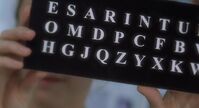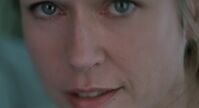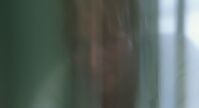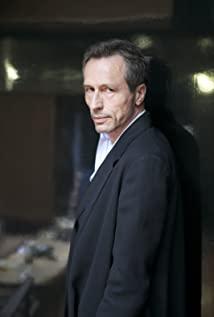It's not the gangster or the mid-life crisis that traps him, it's his own body. It was so completely trapped that only the left eyelid and eyeball could move vertically, and all other parts of the body could not obey. In such a "diving bell" state, the hero begins to swim like a butterfly.
The film has the typical characteristics of French cinema: a kind, beautiful and tearful woman, an old man with white hair who rambles about the past, a son who loves his father, a father who loves his son, a beautiful lover, warm music, all Everything is romantic and moving. These film languages are linked together to illustrate a very profound philosophical proposition: When you suddenly lose your body and leave your consciousness in the world, what is the meaning of your life?
At the beginning of the film, the long subjective shot makes you unconsciously become a diving bell: the blurred scene, the crowded people, like heaven; everyone's face is in front of you, becoming a close-up of excitement , as if you were a newborn baby; a doctor like a professor came to the news, explained your current state in complicated terms, and when you said you understood what he meant, and answered who you were and the name of the child, they were completely ignore.
The consciousness is awake, but he can't make the simplest sound, and he can't make the simplest response, which is smaller than the ability of a baby. When you understand this, you have grown and matured, and you have passed the age of confusion, how should you face the world in front of you that is confined by a small vision?
You don't even know the decay of the right eye. When the doctor uses needle and thread, stitch by stitch through your right eyelid, to sew them together, you see the movement of the needle and thread, and the fear tries to awaken the pain, but in vain. The right eye gets less and less light until it is completely sutured. So the only part of your body that can come into contact with the world is the left eye.
You're getting used to seeing the world with your left eye, and it's a bit biased and less arbitrary, but after all, it can convey information. The nurses patiently teach you to use the special alphabet for arranging the words you want to express, which is maddening at first. Gradually, you find that this is the only way you can hope to communicate with others, and you finally use "yes" and "no" to form a word - I, and the first sentence - I want do die. The paramedic takes a hit and cries, then comes back into your sight and apologizes.
At this point, the viewer finally withdraws from the role of the diving bell, and perceives a profound philosophical metaphor in the extremely simple word "I". When a baby is born, the first sound it makes is an instinctive cry. This instinct is actually the simplest open mouth. After opening his mouth, the airflow spewed out, proving his existence with an unconscious "wow" sound. And an adult, when he needs to re-establish his connection with the world, his instinct has become a self-affirmation, no matter what, use all the power to use "I" to show his existence. What is profound is that after "I" exists through autonomous expression, it is followed by "wanting to die", that is, voluntarily giving up the right to live. Thus, an adult completed the transition from "I am" to "I am dead" in only one sentence.
The body of the diving bell is shameful, but the diving bell is still loaded with sober consciousness: the wife is here, haggard, with tears in her concerned eyes; the lover from afar, standing in front of a dilapidated railway platform, sad, crying, never Courage to set foot on the train bound for him; shave for his 90-year-old father, all nerves carefully follow the blade, slashing the old man's jaw and cheek one by one; the old friend comes, the silver-white, thin hair is in the wind Scattered in the middle, he rambled about the unbearableness, fear and anger of being kidnapped; young friends came, put on a thick cotton hat for him, and spent a full night with him; patient records When the members came, they communicated with themselves letter by letter and cried for their love story; in the church, the priest exhorted himself to believe in the Lord and Jesus; when the children came, they celebrated Father's Day with a person who would not move, Sending a farewell kiss when leaving; a medieval noble lady, guarding her relatives who had lung disease, she made eye contact with herself; the dance master ran freely in the corridor, expressing her passion for art with her body; flowers were spraying, Insects are busy, icebergs are breaking apart, the sea is surging...
Although there is no body, the soul can travel. It is precisely because of the absence of the body that the soul is like a butterfly, light and unconstrained, it can feel people and love more delicately, and can visit the memories of the past and the time after death more truly. When he eventually died of lung cancer, the body was even more insignificant. He once penetrated life in the way of a butterfly, and there is no body in the diving bell.
View more about The Diving Bell and the Butterfly reviews











